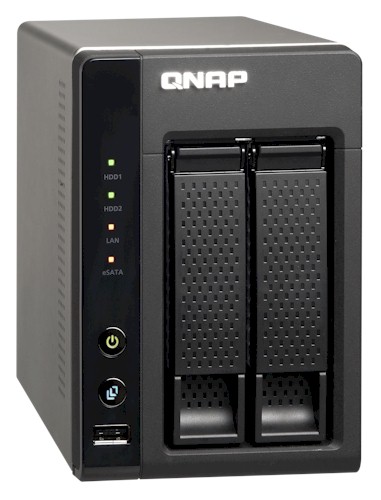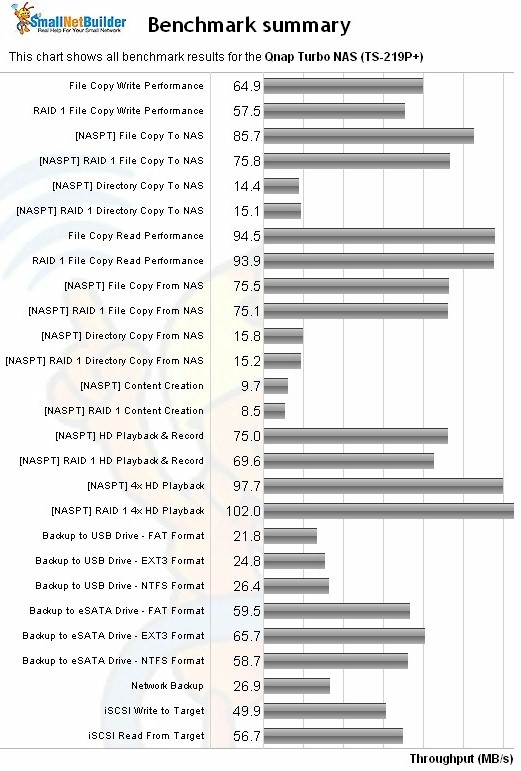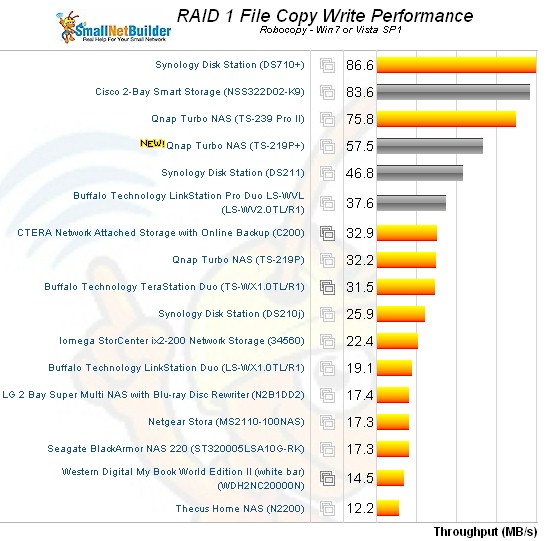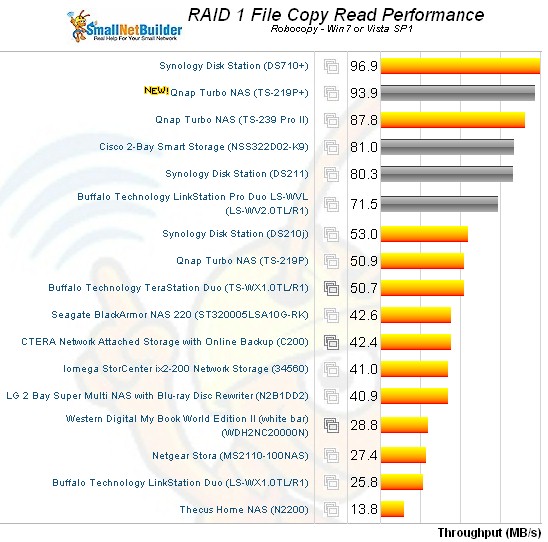The QNAP TS-219P+ has been added to the NAS Charts.
The TS-219P+ is a dual-drive version of its new 1.6 GHz Marvell Kirkwood based NAS that I recently tested.
It shares all of the 119P+’ attributes and adds individual, JBOD, RAID 0 and RAID 1 volume support.

QNAP TS-219P+
The 219P+ is bit noisier than its single drive sibling, with a medium low rating due to some fan and drive noise audible in a quiet home office setting.
Power consumption measured 18 W with the two 1 TB SAMSUNG Spinpoint F3 HE103SJ 3.5" SATA drives QNAP loaded into the review sample spinning and a low 8 W with the drives spun down after a programmable idle period.
Tests were run with 3.3.8 Build 1217T updated firmware using our latest test process. The Benchmark summary below gathers all the test results into one place for easy reference.

QNAP TS-219P+ Benchmark Summary
Windows File copy write measured 65 MB/s and read came in at 95 MB/s, virtually the same as the single-drive TS-119P+. NASPT File Copy benchmarks typically yielded different results with higher write speed (86 MB/s) but lower read (76 MB/s). The tougher NASPT Directory Copy tests yielded only 14 and 16 MB/s for write and read, respectively.
The difference between RAID 0 and 1 performance is mainly confined to file copy write tests. Read throughput was just about equal for RAID 0 and 1.
Like the 119P+, the 219P+ wasn’t able to complete all NASPT tests and Office Productivity results in the Benchmark summary are missing. Failure to complete all tests can be due to write cacheing, oplocks or simultaneous connection limits baked into the NAS OS and usually occur in one of the NASPT tests that reads and writes multiple folders of small to medium sized files. I tried running tests in a different sequence, but just got a different test to fail.
Backup speed to an attached USB drive peaked at 26 MB/s for an NTFS-formatted volume, and once again a bit lower at 25 and 22 MB/s for EXT3 and FAT volumes, respectively. Switching to an eSATA connection to our standard Iomega UltraMax Pro configured in RAID 0 yielded speedier results of 60, 56 and 59 MB/s for FAT, EXT3 and NTFS formats, respectively. Rsync network backup to the NAS testbed running Delta Copy produced 27 MB/s, similar to attached USB drive speeds.
iSCSI write and read to a 10 GB target on a RAID 1 volume produced 50 MB/s and 57 MB/s, respectively.
For competitive comparison, check the RAID 1 File Copy Write and Read charts below, filtered for dual-drive NASes. The 219P+ lags significantly behind both the TS-239 Pro II and its Cisco NSS322 (clone of TS-259 Pro)—no surprise since the latter two are both Intel Atom-based.

File Copy Write Comparison – dual bay NASes
But on read the 219P+ actually surpasses both Atom-based competitors and is second only to the Atom D410 based Synology DS710+.

File Copy Read Comparison – dual bay NASes
Of course, the DS710+ is $150 more expensive than the 219P+, which isn’t exactly cheap at around $350. Some lower priced alternatives in the same performance tier are the Synology DS211 (around $300) and new "V series" Buffalo LinkStation ProDuo at $250, with 2 TB of storage included.
QNAP’s V3.3 OS feature set is covered in the recent review, so there is no full review planned for the TS-219P+. Please use the NAS Charts to further explore and compare the TS-219P+’ performance.
